|
|
|
Sort Order |
|
|
|
Items / Page
|
|
|
|
|
|
|
| Srl | Item |
| 1 |
ID:
105215
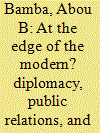

|
|
|
|
|
| Publication |
2011.
|
| Summary/Abstract |
Centred on the first post-independence state visit of Ivorian President Félix Houphouët-Boigny to the United States in May 1962, this article critically engages the recent scholarly attention that has focused on modernisation theory and international media scholarship as they apply to African diplomacy. Contrary to the pervasive post-war modernisation paradigm, it is argued that postcolonial African governments had appropriated a form of managing foreign public affairs that satisfied the logic of media performance of modern nations. If anything, the interwar and post-war nationalist upheavals in Africa provided a training ground for the likes of Houphouët-Boigny who readily appropriated Euro-American forms of political performance to advance their agenda in the public (transnational) sphere. Whereas Houphouët-Boigny and his envoys clearly displayed dexterity all along their American visit, the article demonstrates that mass communication outlets played an equally critical role in the performance of this singular moment in transnational statecraft. Analyzing the coverage of the media with historical hindsight, it appears that the Ivorian press particularly stood out because of its celebration of the African head of state and his visit. Bringing nuance to this seeming confirmation of the radical difference of African media practices and their complicity with the state, the article claims that journalists in all three countries subscribed to a "modernist" metaphysics that nurtured and was informed by the culturally chauvinistic logic of the nation-state. Thus, it concludes that the normative comparativism that has usually sustained the historiography of international media studies is more than problematic.
|
|
|
|
|
|
|
|
|
|
|
|
|
|
|
|
| 2 |
ID:
105222
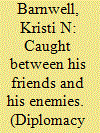

|
|
|
|
|
| Publication |
2011.
|
| Summary/Abstract |
Early in the 1960s, the United States government saw Jordan as a useful ally but hesitated to supply the military and financial backing King Hussein requested. The Johnson administration wavered in its commitment to arm Jordan throughout the crises of the 1960s. After 1967, however, when Hussein found himself on the losing side but survived the crisis, the United States committed itself to Jordan's existence and threw its financial and political support behind him. This article draws on the LBJ Presidential Archives to examine the evolution of the Jordanian-American relationship in this turbulent decade.
|
|
|
|
|
|
|
|
|
|
|
|
|
|
|
|
| 3 |
ID:
105229
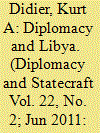

|
|
|
|
|
| Publication |
2011.
|
| Summary/Abstract |
The international community's March 2011 military intervention in Libya contrasts sharply to its reluctance during the preceding forty years to halt the Qadhafi regime's sponsorship of transnational terrorism and pursuit of WMD. American diplomacy, eventually supported by international sanctions, was a four decade effort to end Qadhafi's violent foreign policy. This commentary discusses how diplomacy and the American judicial process combined to achieve this successful outcome. Diplomatic and legislative efforts to compel Libya's payment to terrorism victims helped create judicial remedies enforceable in US Courts and ultimately, a bilateral claims settlement agreement that, while disappointing to the terrorism litigants, normalized relations between the Libya and the United States.
|
|
|
|
|
|
|
|
|
|
|
|
|
|
|
|
| 4 |
ID:
105214


|
|
|
|
|
| Publication |
2011.
|
| Summary/Abstract |
Herbert Hoover is often portrayed as a business-centric relatively non-political historical figure. In particular during his time as Commerce Secretary in the administrations of Warren Harding and Calvin Coolidge, Hoover is often described as supporting a United States foreign policy that first and foremost served the needs of American corporations. This article attempts to recalibrate that picture by stressing Hoover's political self-interest as a motivating factor in his policies. Far from being politically unconcerned, Hoover was a man desperate to become president of the United States. His disastrous campaign for the Republican nomination in 1920 made him doubly determined to use his power in the Republican cabinets to improve his chances for the nomination later. This can be seen in one of the most famous of Hoover's foreign policy interventions, the Anglo-American rubber crisis. Far from serving the needs of American business, during this crisis Hoover was acting mostly from political self-interest. In particular attacking the British allowed him to reframe his image, which was seen as Anglophiliac in 1920. In the end it was a very successful rebranding, as Hoover was able to run for the presidency in 1928 from a position of strength when it came to foreign affairs.
|
|
|
|
|
|
|
|
|
|
|
|
|
|
|
|
| 5 |
ID:
105217


|
|
|
|
|
| Publication |
2011.
|
| Summary/Abstract |
From 1947 until his political demise in late 1962, Vengalil Krishanan Krishna Menon stood at the forefront of India's international relations. One of Indian Premier Jawaharlal Nehru's closest political confidantes, Menon served variously as India's High Commissioner to the United Kingdom, leader of its delegation to the United Nations, self-styled mediator in the Korea, Indo-China, and Suez crises of the 1950s and, from 1957, his country's Defence Minister. Vilified in the West as "India's Rasputin," Menon's left-wing credentials, anti-colonial rhetoric, and willingness to engage with the Communist bloc were seen by Anglo-American diplomats as a threat to Western interests in South Asia. Drawing upon recently released British and American archival records, this article argues that Western misperceptions of Menon, and his role in the Indian foreign policy-making process, undermined Anglo-American relations with India for much of the early Cold War.
|
|
|
|
|
|
|
|
|
|
|
|
|
|
|
|
| 6 |
ID:
105227


|
|
|
|
|
| Publication |
2011.
|
| Summary/Abstract |
This article focuses upon the British defence cuts undertaken during the final governments of Harold Wilson, 1974-1976, within the broader context of the Anglo-American "special relationship." Utilising previously classified material, it shows how the United States attempted to negate the severity of Britain's defence cuts. Such efforts were largely futile in preventing such reductions. Moreover, Anglo-American co-operation in a number of highly sensitive areas remained largely unaffected. Rather, the consequence for Anglo-American relations was for Britain to lose political standing in the opinion of the Nixon-Ford administrations. In the short term, this process was to have little discernable impact. Rather the repercussions of this became clear once Wilson had left office, most notably during the International Monetary Fund Crisis of 1976.
|
|
|
|
|
|
|
|
|
|
|
|
|
|
|
|
| 7 |
ID:
105219
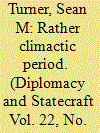

|
|
|
|
|
| Publication |
2011.
|
| Summary/Abstract |
From the late 1950s, American officials moved toward a proper appreciation of tensions in the Sino-Soviet alliance. However, prior to Autumn 1962 uncertainty remained in Washington over Beijing's willingness to break with the Kremlin in pursuit of its ideological objectives and national ambitions. This article demonstrates how the Sino-Indian border war in November 1962 and Beijing's response to the Cuban Missile Crisis shaped American understandings of the Sino-Soviet dispute and the China threat. Following developments in Autumn 1962 officials in the Kennedy Administration found cause to believe that China was not only the more militant of the two communist powers, but also that it was the more dangerous. This shift in threat perception had a significant impact on the US national security discourse, reinforcing the conviction of senior officials in Washington that the containment of China required a continued policy of non-engagement.
|
|
|
|
|
|
|
|
|
|
|
|
|
|
|
|
| 8 |
ID:
105224


|
|
|
|
|
| Publication |
2011.
|
| Summary/Abstract |
In its Cold War struggle against communism in Latin America, the John F. Kennedy Administration faced a dilemma. How could it maintain the support of anticommunist yet authoritarian regimes whilst concurrently promoting the political liberalisation of those regimes, as Kennedy's core policy toward Latin America-the Alliance for Progress-seemingly mandated? In Paraguay, the Stroessner regime provided Kennedy officials with a clear test of its ability to craft a policy that appropriately balanced both considerations. This case study explores how bureaucratic politics decisively shaped the implementation of that policy, ultimately leading to a continuation in the broader pattern of maintaining support for authoritarian regimes that embraced US leadership in the Cold War.
|
|
|
|
|
|
|
|
|
|
|
|
|
|
|
|
| 9 |
ID:
105213
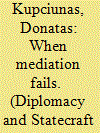

|
|
|
|
|
| Publication |
2011.
|
| Summary/Abstract |
This article examines British involvement in solving the Vilnius dispute in 1920-1923, where Britain was caught between its desire to maintain Allied solidarity with the French and its own foreign policy prescriptions. In the context of the complexities of the relationship between the two Allied Powers that often took a "friend-but-foe" form, tension between the two goals conditioned the ultimate fiasco of British dispute mediation initiatives. Britain's desire to act entirely in accordance with France led the former to renounce many feasible dispute settlement initiatives, including the possibility of forestalling conflict, whilst the lack of similar devotion to Allied solidarity on the French side and the atmosphere of mistrust between the two Allied Powers undermined the British initiatives for which it was prepared to stand.
|
|
|
|
|
|
|
|
|
|
|
|
|
|
|
|
|
|
|
|
|